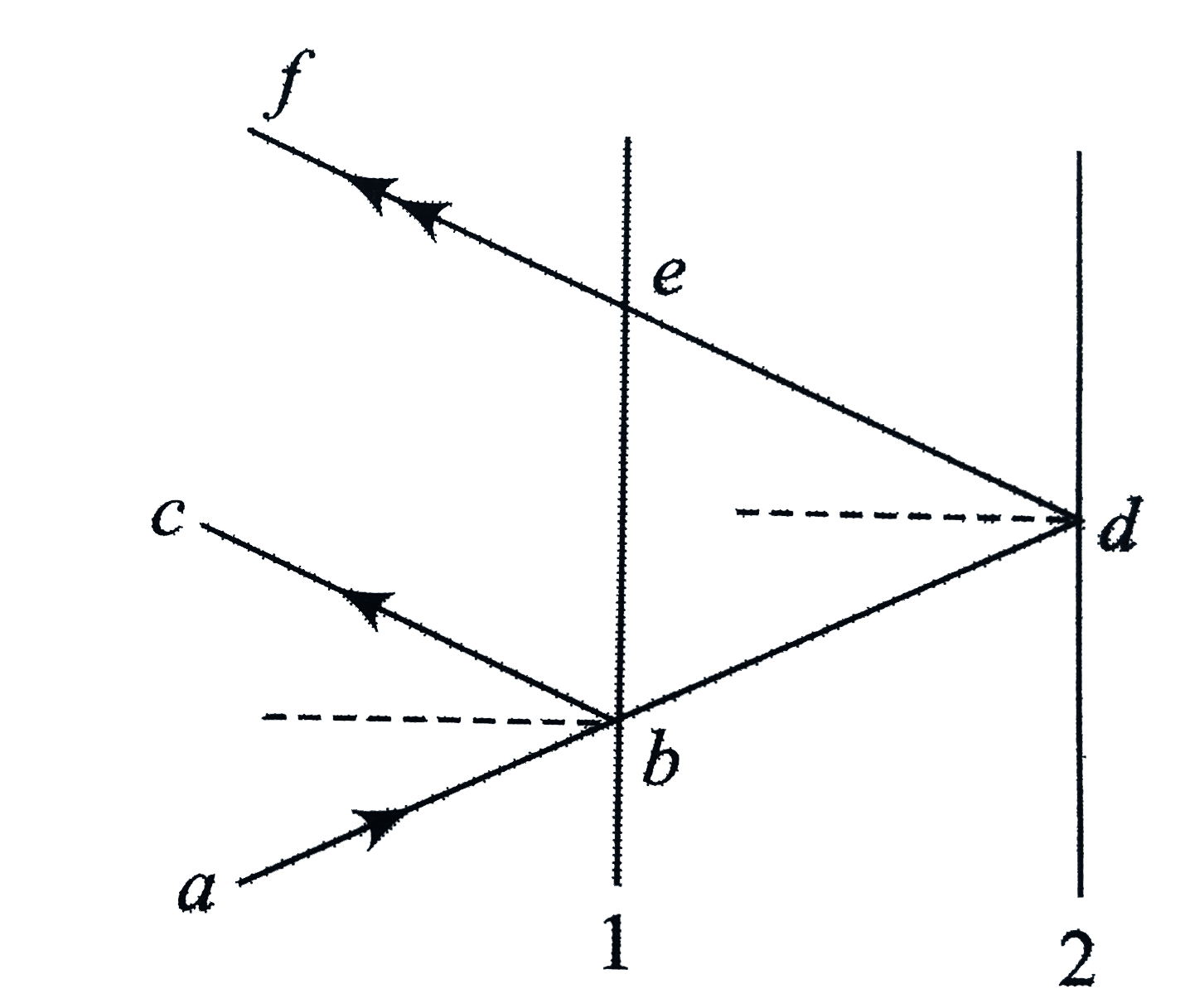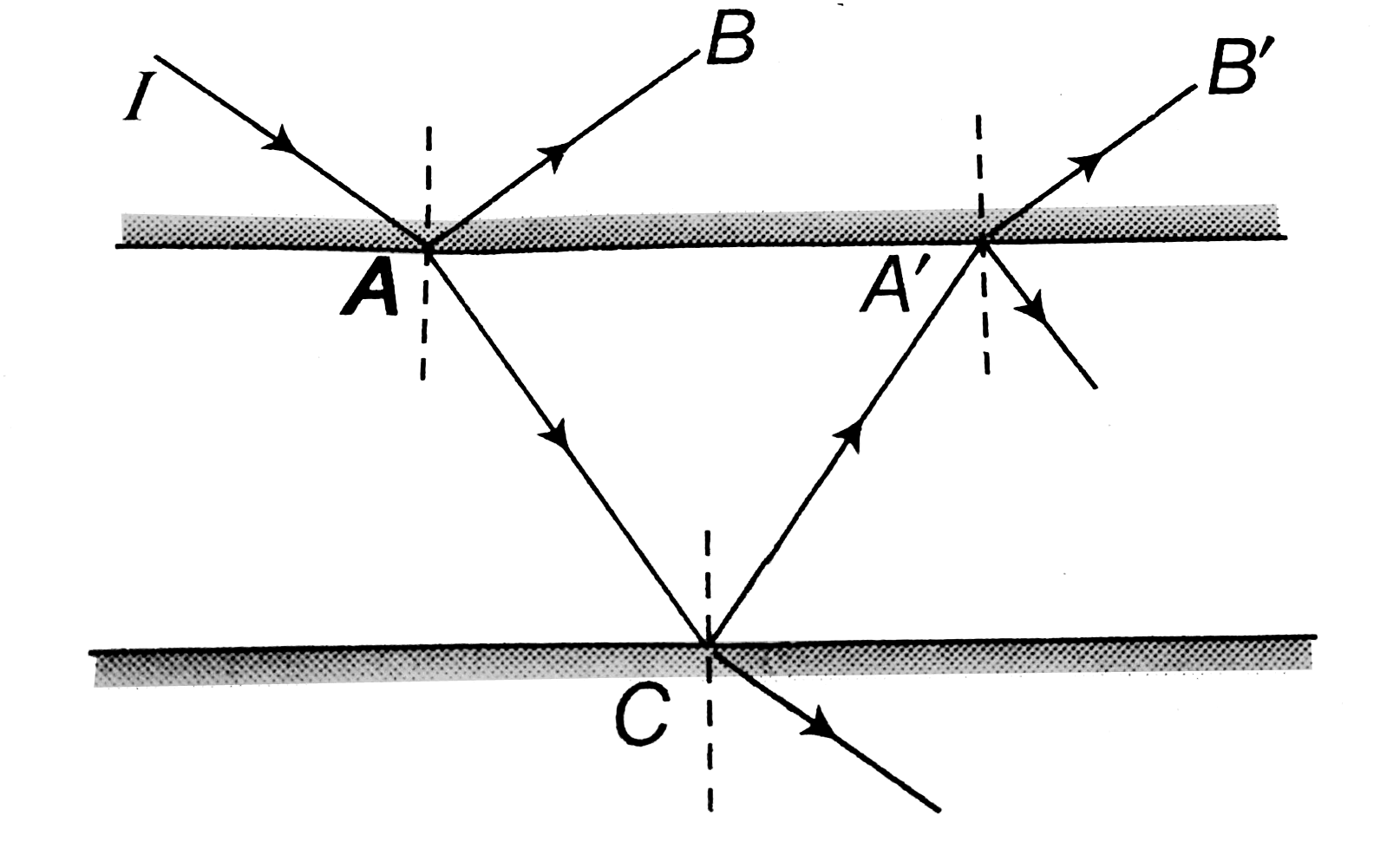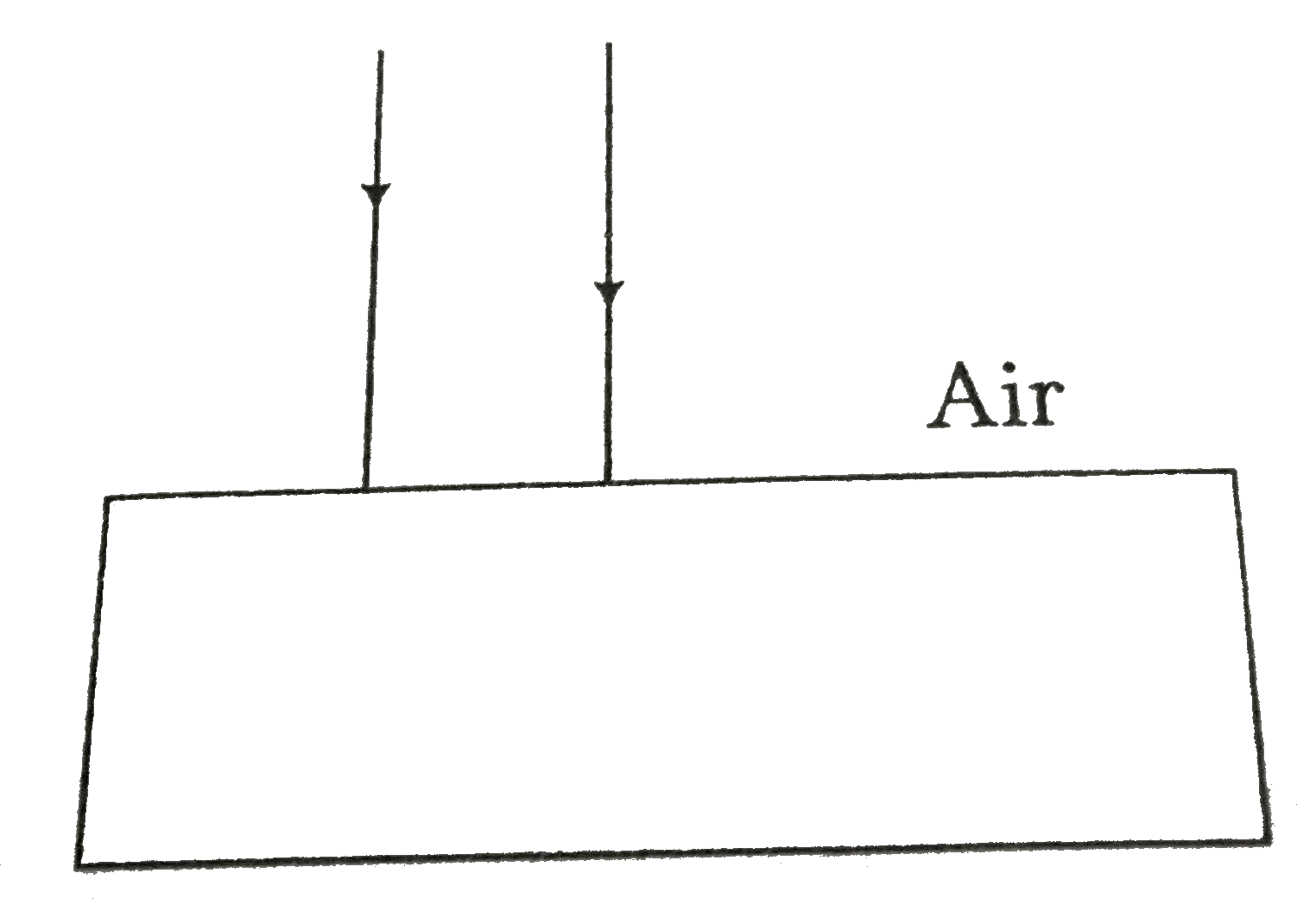A narrow monochromatic beam of light of intensity 1 is incident on a glass plate as shown in figure Another identical glass plate is kept close to the first one and parallel to it. Each glass plate reflects 25% of the light incident on it and transmits intensities in the interference pattern formed by two beams obtained after one reflection at each plate.

The correct Answer is:7
I is the intensity of incident beam ab. The interfering waves are be and ef, reflected from surface of I and II plate, respectively.
Reflection coefficient of intensity.
r=5%=0.25
Transmission coefficient of intensity,
t=75%=0.75
The intensity of beam bc, I1=0.25I=14I
The intensity of beam bd=0.75I.
The intensity of beam de=0.25×0.75I
The intensity of beam ef,
I2=0.75×0.25×0.75I=964I
Ratio of maximum and minimum intensities,
√Imax√Imin=√I1+√I2√I1−√I2=7
Topper's Solved these Questions
- BOOK - CENGAGE PHYSICSCHAPTER - WAVE OPTICSEXERCISE - Integer3videos
WAVE OPTICS
- BOOK - CENGAGE PHYSICSCHAPTER - WAVE OPTICSEXERCISE - Archives4videos
WAVE OPTICS
- BOOK - CENGAGE PHYSICSCHAPTER - WAVE OPTICSEXERCISE - Assertion- Reasoning13videos
WAVE OPTICS
- BOOK - CENGAGE PHYSICSCHAPTER - THERMODYNAMICSEXERCISE - QUESTION BANK34videos
THERMODYNAMICS
- BOOK - CENGAGE PHYSICSCHAPTER - WAVESEXERCISE - QUESTION BANK38videos
WAVES
Similar Questions
_E01_107_Q01.png)
A narrow monochromatic beam of light of intensity I is incident on a galss plate as shown in figure. Another identical glass plate is kept close to the first one & parallel to it. Each glass plate reflects 25% of the light incident on it % transmits the remaining find the ratio of the minimum & the maximum intensities in the interference pattern formed by the two beams obtained after one reflection at each plate.View SolutionA narrow monochromatic beam of light of intensity I is incident on a glass plate. Another identical glass plate is kept close to the first one and parallel to it. Each plate reflects 25% of the incident light and transmits the remaining. Calculate the ratio of minimum and maximum intensity in the interference pattern fromed by two beams obtained after reflection from each plate.
View Solution
Knowledge Check
- Question 1 - Select One
A ray of light intensity I is incident on a parallel glass-slab at a point A as shown in figure. It undergoes partial reflection and refraction. At each reflection 25% of incident energy is reflected. The rays AB and A′B′ undergo interference. The ratio Imax/Imin is
 A4:1B8:1C7:1D49:1
A4:1B8:1C7:1D49:1 - Question 2 - Select One
A ray of light intensity I is incident on a parallel glass-slab at a point A as shown in figure. It undergoes partial reflection and refraction. At each reflection 25% of incident energy is reflected. The rays AB and A′B′ undergo interference. The ratio Imax/Imin is
 A49:1B7:1C4:1D8:1
A49:1B7:1C4:1D8:1 - Question 3 - Select One
A parallel beam of light of intensity I is incident on a glass plate. 25% of light is reflected in any reflection by upper surface and 50% of light is reflected by any reflection from lower surface. Rest is refracted The ratio of maximum to minimum intensity in interference region of reflected rays is
 A⎛⎜ ⎜⎝12+√3812−√38⎞⎟ ⎟⎠2B⎛⎜ ⎜⎝14+√3812−√38⎞⎟ ⎟⎠2C58DNone of these
A⎛⎜ ⎜⎝12+√3812−√38⎞⎟ ⎟⎠2B⎛⎜ ⎜⎝14+√3812−√38⎞⎟ ⎟⎠2C58DNone of these
_E01_093_Q01.png)
A ray light of intensity I is incident on a parallel glass-slab at a point A as shown in figure it undergoes partial reflection and refraction. At each reflection 20% of incident energy is refracted rays AB and A'B' undergo interference find the ratio Imax/IminView SolutionTwo thin glass plates are placed parallel to each other such that distance between them is very small. Each glass plate reflects 25% of incident energy and transmits remaining 75% Light beam is incident on this system. Consider the interference of two light beams obtained after one reflection from each glass plate. Calculate ratio of the maximum to minimum intensity.
View SolutionA ray of light of intensity I is incident on a parallel glass slab at a point A as show. It undergoes partial reflection and refraction. At each reflaction 25% of incident energy is reflected. The rays AB and A'B' undergo interference. The ratio Imax/Imin is
 View Solution
View SolutionA ray of unpolarised light is incident on a glass plate of refractive index 1.54 at polarising angle, then angle of refraction is :
View SolutionA ray of light in incident on a glass plate at an angle of 60∘. What is the refractive index of glass if the reflected and refracted rays are perpendicular to each other?
View Solution

